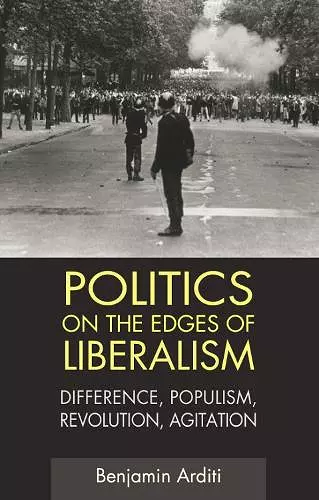Politics on the Edges of Liberalism
Difference, Populism, Revolution, Agitation
Format:Hardback
Publisher:Edinburgh University Press
Published:10th Jan '07
Currently unavailable, and unfortunately no date known when it will be back

Politics on the edges of liberalism refers to a grey zone where phenomena such as difference, populism, revolution and agitation turn the distinction between the inside and the outside of liberalism into a matter of dispute.Each chapter takes on one of these ideas, discussing the intellectual background animating the politics of the culture wars and its celebration of particularism over the universalism of classical liberal thought. Populism becomes a spectral recurrence rather than an outside of democracy. Agitation reappears in emancipatory politics, and the idea of revolution is thought through outside the Jacobin view of insurrection, overthrow and total re-foundation.This is truly interdisciplinary inquiry at the cutting edge of contemporary debates in politics, critical theory, philosophy and sociology. The author draws from an impressive range of thinkers such as Kant, Benjamin, Derrida, Freud, Schmitt, Rancière, Gramsci, Canovan, Oakeshott, Foucault, Vattimo, Laclau and
The interest and value of Arditi's position is that he does not jump directly from this opening possibility oc citizenship-as-creativity to a theory of nomadic action taking plae at the grassroots level of the virtual. Instead he routes these ideas through the concept of populist politics - a gesture which saveshis project from becoming just the latest spin on Deleuze-Guttari and political theory… Arditi is developing a unique project, located between classical political thought and viral resistance. -- foucaultisdead.wordpress.com
The arguments and conclusions of Politics on the Edges of Liberalism boil down to a mature and compelling distillation and synthesis of Laclauian and Rancierean insights... Arditi is a theorist of political activism. This book is extremely well-versed in both traditional and radical Continental and Anglo-American political and cultural theory, so it will be of interest and importance both to political theorists and to political activists... Arditi surveys, analyses and takes what is best from any political theory and deploys it in the development of new concepts that will stimulate action and activism in academic theory as well as cultural and political practice. -- Paul Bowman * Culture Machine *
A very welcome addition to the field of post-structuralist political theory... Arditi’s take on populism is outstanding, and perhaps represents the most sophisticated conceptualisation of this difficult topic in the literature to date... What is most exciting about this book overall is how successfully it marries sharp theoretical insight with conceptual tools for real-life political activism. In this sense, it is a brilliant example of that good oldfashioned Marxist term, praxis. Written clearly, concisely and with a particularly deft touch, it is highly recommended to political theorists and activists alike. -- Benjamin Moffitt, University of Sydney * Political Studies Review *
Arditi's work is an admirable and worthwhile addition to the theory of the liberal-democracy and its 'edges'. -- J. Maggio, University of Florida * Theory & Event *
Arditi navigates skilfully between Continental philosophy and political theory by critically engaging with major figures from both fields. His approach is thoughtful and provocative... On populism, in particular, he is brilliant. This book is essential reading for those who are interested in democracy, emancipatory politics, radical alternatives, and critical thinking. It is political theory at its best. -- Andreas Kalyvas, The New School for Social Research
Arditi is developing a unique project, located between classical political thought and viral resistance. Politics on the Edges of Liberalism should be viewed less as a compromise between the two, and more of a stepping stone towards a radical synthesis of some sort -- Foucaultisdead.wordpress.com
The interest and value of Arditi's position is that he does not jump directly from this opening possibility oc citizenship-as-creativity to a theory of nomadic action taking plae at the grassroots level of the virtual. Instead he routes these ideas through the concept of populist politics - a gesture which saveshis project from becoming just the latest spin on Deleuze-Guttari and political theory… Arditi is developing a unique project, located between classical political thought and viral resistance.' - foucaultisdead.wordpress.com, posted 13 February 2007 -- Foucaultisdead.wordpress.com
In the best sense of political philosophy as understood by Gilles Deleuze … Arditi invents new concepts … he has the extraordinary ability to achieve clarity while dealing with very arcane and sophisticated aspects of political thought. -- Professor Michael J. Shapiro, University of Hawaii
At the cutting edge of contemporary theory. -- Professor Terrell Carver, University of Bristol
ISBN: 9780748625116
Dimensions: unknown
Weight: 350g
176 pages